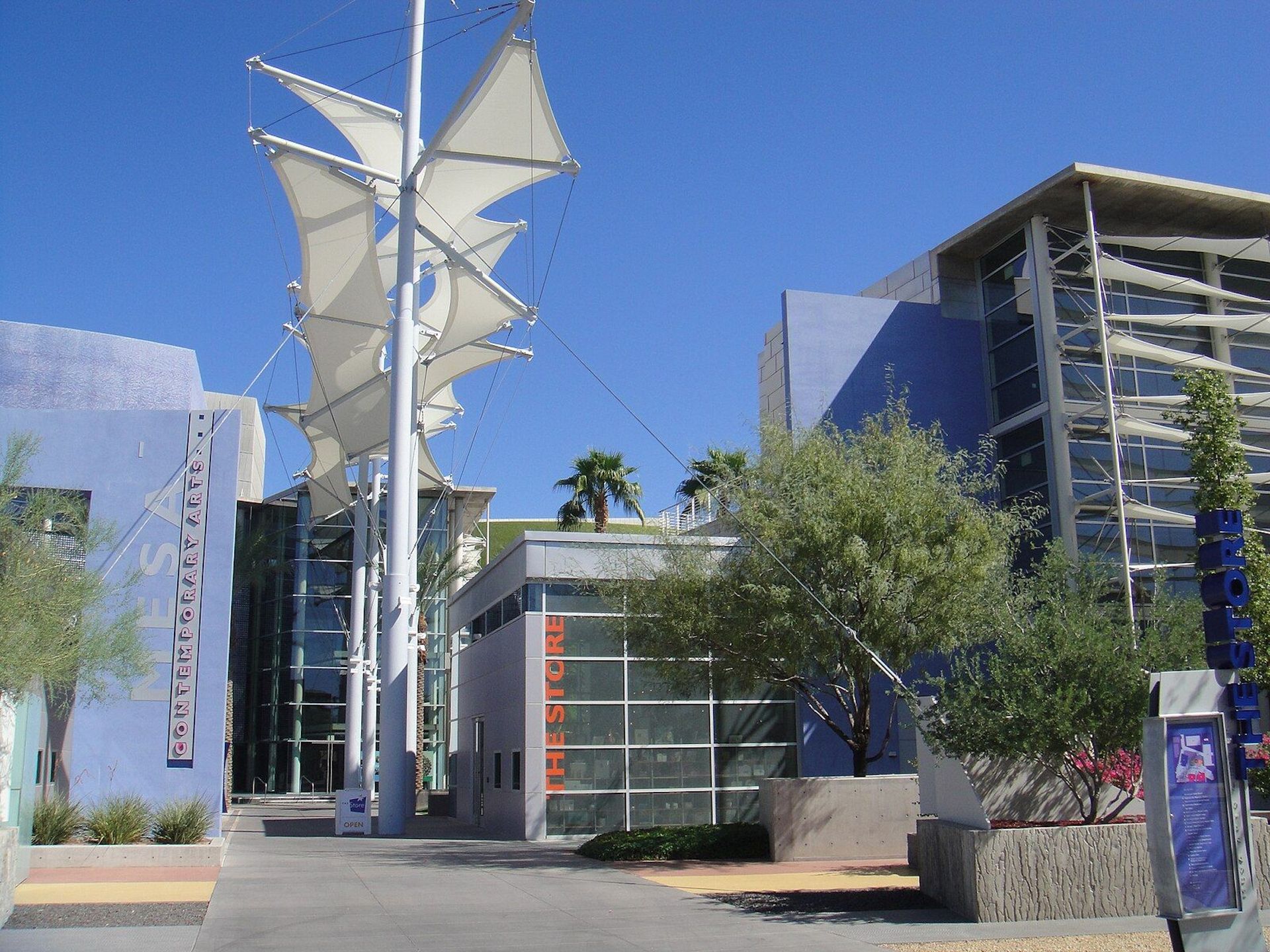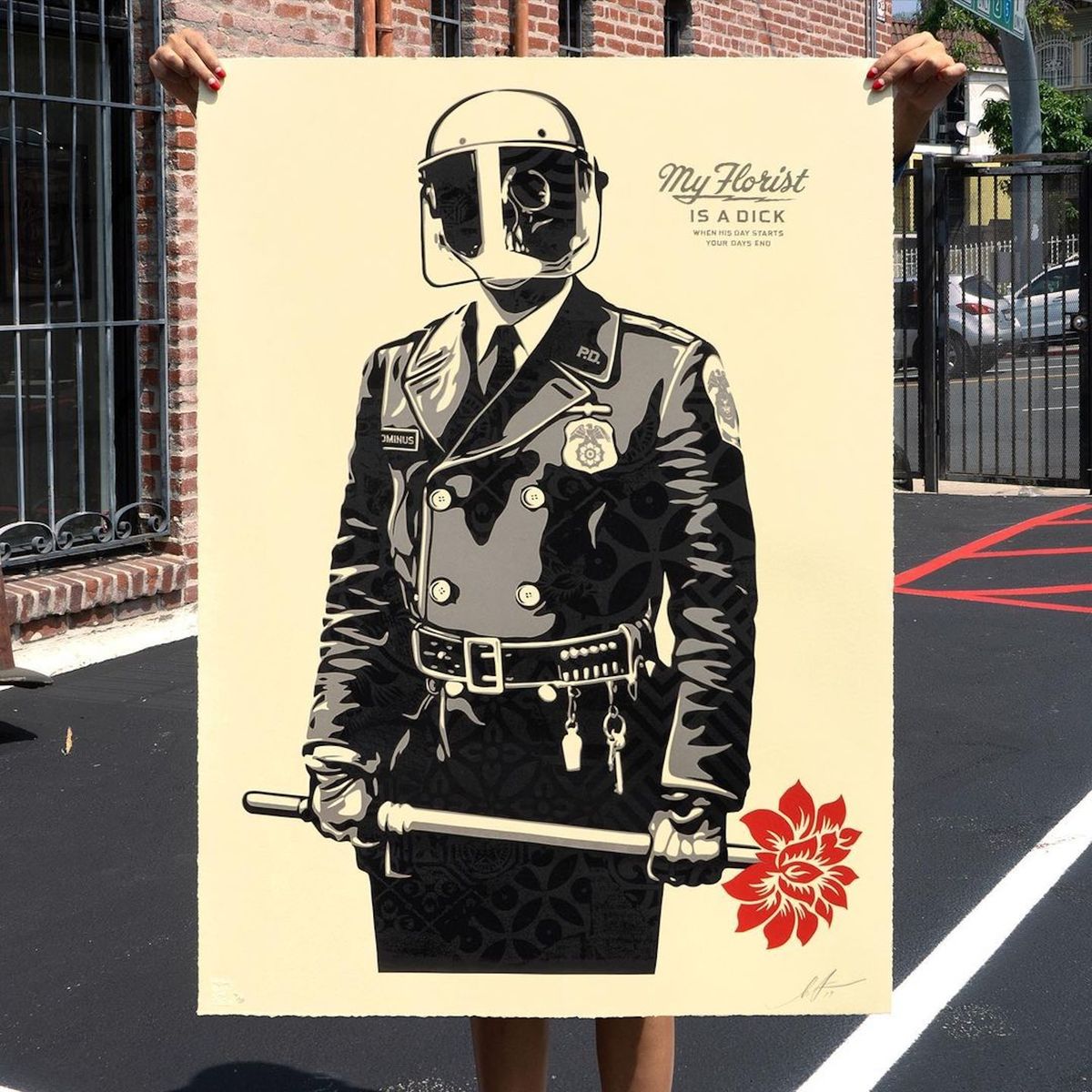The former chief curator of the Mesa Contemporary Arts Museum, Tiffany Fairall, is suing the city of Mesa, Arizona, claiming that it violated her rights to free speech when it demanded a work alluding to police brutality be removed from a Shepard Fairey exhibition. The lawsuit, filed in Arizona district court on 31 October and naming six current and former municipal officials as co-defendants, also alleges that the city violated her rights by firing her in retaliation “for opposing discrimination”.
The lawsuit, which was first reported by Southwest Contemporary, recounts not only the events related to the American artist Fairey’s exhibition at the centre of the controversy, but also attempts to convey a pattern of seemingly censorious behaviour by municipal employees in Mesa. Other instances outlined in the complaint include an incident in June 2020 when Fairall was allegedly chastised for wearing a Black Lives Matter shirt during a virtual meeting. Another is a message received later that year suggesting that Fairall and Cindy Ornstein, the city’s director of arts and culture and the executive director of the Mesa Arts Center at the time, were organising exhibitions that were “too liberal”.
The work at the centre of the controversy is a 2019 print by Fairey, My Florist is a Dick (2019), which depicts a skull-faced police officer in riot gear wielding a nightstick topped with a flower. Adjacent text reads: “My florist is a dick. When his day starts, your days end.” It was originally due to be included in the exhibition Facing the Giant: 3 Decades of Dissent at the Mesa Contemporary Arts Museum, an institution housed in the city-owned Mesa Art Center. After issues were raised with the My Florist is a Dick print, specifically concerns that its message opposing police brutality might offend members of Mesa’s municipal police force, the Fairey exhibition and two others——solo shows by the Native American artists Thomas “Breeze” Marcus (Tohono O’odham) and Douglas Miles (San Carlos Apache, Akimel O’odham)—were delayed. Fairall claims she was told that the Fairey exhibition could only proceed if My Florist is a Dick was removed.

The Mesa Contemporary Arts Museum Photo by Cygnusloop99, via Wikicommons
At the time several freedom of expression organisations—including the National Coalition Against Censorship (NCAC), the American Civil Liberties Union (ACLU) of Arizona and Pen America—issued statements decrying the city of Mesa’s actions.
“Government-run agencies may determine what arts projects to fund and display, but their First Amendment obligations explicitly prevent them from denying projects with messages they dislike while permitting those they support,” Elizabeth Larison, the director for the arts and culture advocacy programme at NCAC, and Jared Keenan, ACLU Arizona’s legal director, wrote in a joint statement. “Efforts to prevent the display of an artwork on account that it might cause offense does not justify censorship. In this era of intense political polarisation, many artworks may be offensive to someone’s viewpoint.”
The Fairey exhibition ultimately opened on 7 October, with My Florist is a Dick included. The show closed on 21 January 2024. According to the complaint Fairall faced several health problems during the period of the censorship controversy, some of which were worsened by the stress of the conflict and additional bureaucracy imposed on her activities as a result. Last February she filed complaints alleging retaliation and sex and disability discrimination with the federal Equal Employment Opportunity Commission. In May of this year, the city fired Fairfall.
In the lawsuit, Fairfall alleges the entire saga has negatively affected her “long-term employment and income potential” and caused her “humiliation, trauma, extreme stress, depression and physical and mental pain and anguish”. She alleges that Mesa violated rights enshrined by the First Amendment and the 14th Amendment, and that the defendants’ “conduct unlawfully chills free and open discussion on issues of public importance and intimidates other city employees and members of the community from similarly engaging in protected speech”.
Fairfall is seeking a jury trial and ultimately relief in the form of damages, back pay, lost benefits, compensation for the alleged infringements on her rights and harm to her reputation and mental health, plus related interest. She is also seeking to have her position reinstated, or commensurate compensation. She is being represented by the Phoenix-based law firm Shields Petitti & Zoldan.
In a statement to Southwest Contemporary, a spokesperson for the city of Mesa said “we are going to abstain since litigation is pending”.


